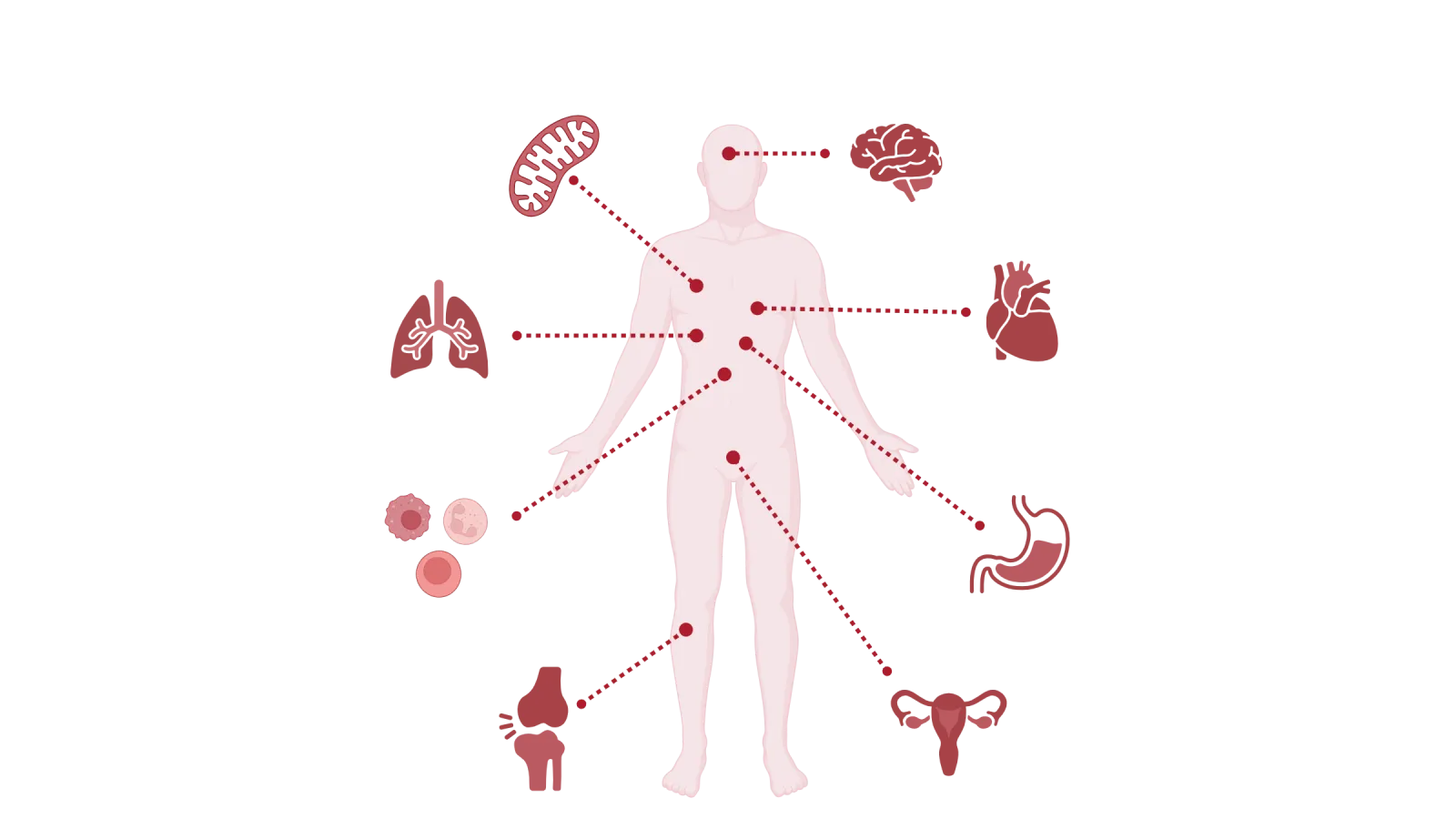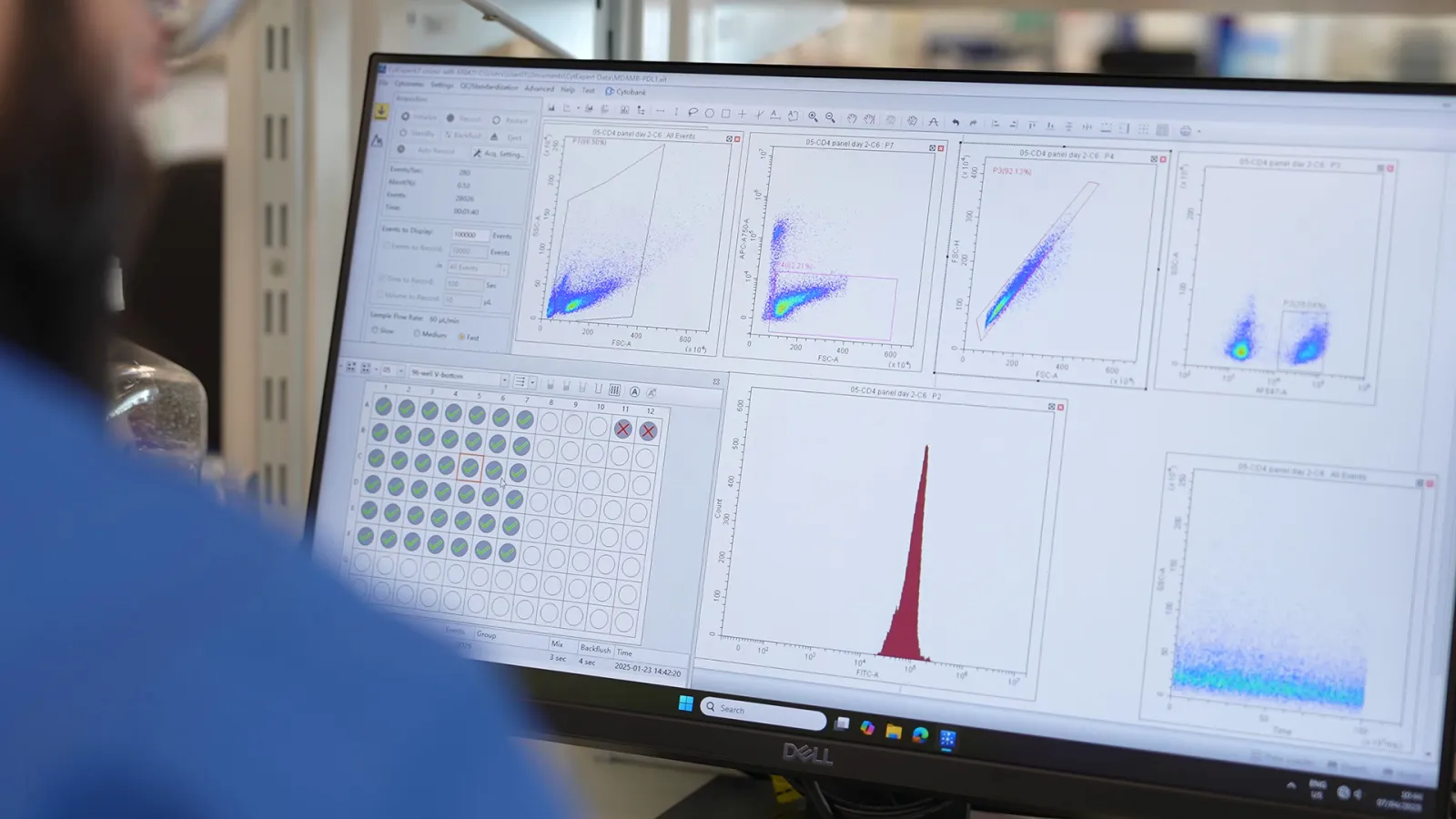

Therapeutic Areas
Excellerate offers expertise across a diverse range of therapeutic areas, with a proven track record in successful drug discovery project support for multiple indications.
These include, but are not limited to: Cardiovascular, Respiratory, Metabolic diseases, Immunology, Oncology, CNS
Our precision-driven approach ensures that we address the specific challenges of each disease area. By closely aligning with your project needs, we tailor our scientific support to accelerate your research and achieve actionable outcomes.
Our Capabilities
Therapeutic Areas
Therapeutic Areas
Immunology
Understanding immune system regulation is crucial for developing therapies targeting autoimmune diseases and chronic inflammatory conditions.
Excellerate provides advanced immunology platforms to investigate immune cell function, cytokine signaling, and immune modulatory effects of drug candidates.
Our flexible approach allows for customized assay development to meet the unique and complex demands within immunology discovery:
Immune Cell Profiling & Activation: Detailed characterization of immune cell phenotypes and functional states (e.g. T- and B-cell activation/polarization and proliferation, monocyte-to-macrophage differentiation with M1/M2 profiling).
Cytokine Release & Immunomodulation: Quantification of cytokine and chemokine secretion using ELISA and multiplex assays.
Phagocytosis, Cytotoxicity & NETosis: Assessment of neutrophil extracellular trap formation, macrophage phagocytic activity, and NK/T cell-mediated cytotoxicity.
Target Engagement & Internalization: Flow cytometry and high-content imaging analysis for receptor internalization and immune checkpoint engagement.
Inflammation Models and Pathway Analysis: Models of inflammatory diseases, including cytokine storm simulations and chronic inflammation assays (e.g. NF-κB, JAK/STAT, MAPK signaling).
Metabolic Diseases
Metabolic disorders such as diabetes and obesity involve complex dysregulation of energy homeostasis and metabolic signaling pathways.
Excellerate have developed robust in vitro models to investigate the mechanisms underlying metabolic diseases and evaluate the therapeutic potential of candidate compounds.
Excellerate's assay platforms deliver insights into metabolic function and signaling:
Signaling & Glucose Uptake: Assessment of insulin sensitivity, glucose uptake assays, differentiation processes and signaling pathway analysis, and lipid accumulation in adipocytes, hepatocytes, and muscle cell lines.
Mitochondrial Function & Bioenergetics: Analysis of cellular/mitochondrial respiration, glycolytic flux, membrane potential, and reactive oxygen species (ROS) production.
Inflammation & Metabolic Dysfunction: Macrophage polarization, cytokine profiling, and inflammation models to investigate immuno-metabolic interactions.
Fibrosis in Metabolic Disease: Evaluation of hepatic stellate cell activation and extracellular matrix deposition in liver fibrosis models.
β-Cell Function & Insulin Secretion: Evaluation of pancreatic islet cell function, insulin secretion, and β-cell viability.
Respiratory
Respiratory diseases, including asthma, COPD, and pulmonary fibrosis, present significant therapeutic challenges due to complex inflammatory and remodeling processes.
Excellerate provides leading in vitro pharmacology expertise to explore underlying mechanisms of respiratory diseases and evaluate the therapeutic potential of novel compounds.
Our comprehensive assay platforms enable detailed analysis of compound effects on respiratory function, inflammation, and tissue remodeling:
Pulmonary Fibrosis Models: Fibroblast-to-myofibroblast transition (FMT) assays, extracellular matrix deposition, and pro-fibrotic signaling in lung fibroblast/epithelial cell models.
Airway Inflammation & Immune Modulation: Cytokine profiling, immune cell co-culture systems, and inflammatory mediator release in bronchial epithelial models.
Oxidative Stress & Mitochondrial Dysfunction: ROS production, mitochondrial activity assays, and responses to hypoxia/reoxygenation injury.
Inflammation
Excellerate provides advanced in vitro models to investigate both acute and chronic inflammatory processes and evaluate the effects of compounds on inflammation and tissue damage.
We have experience in supporting characterization of anti-inflammatory and disease-modifying compounds across multiple indications through to clinical candidates.
Cytokine & Mediator Release: Quantification of pro- and anti-inflammatory cytokines, chemokines, and lipid mediators.
Fibrosis & Tissue Remodeling: Evaluation of fibroblast activation, ECM deposition, and pro-fibrotic signaling pathways.
Inflammatory Cell Recruitment: In vitro models to study cell adhesion and chemotaxis.
Cellular Stress & Damage Responses: Measurement of oxidative stress, reactive oxygen species (ROS), and stress-induced signaling pathways (e.g. ISR signaling).
Inflammatory Pain & Neuroinflammation: Immune cell activation, and neuro-immune interactions. Inflammasome activation (NLRP3, interleukin secretions).
Therapeutic Areas
Oncology
Excellerate supports oncology drug discovery with assay platforms to investigate cancer biology, including tumor cell proliferation, survival, and metastasis, enabling mechanistic insights into drug efficacy and resistance.
We deliver solutions for evaluating anti-cancer compounds, from target validation to functional outcomes in relevant cancer models.
Cell Proliferation & Viability: High-throughput proliferation assays (BrdU/EdU) and viability measurements using ATP-based, MTT, and imaging (AOPI) approaches to measure compound effects in relevant cell lines.
Apoptosis & Cell Death Mechanisms: Caspase 3/7 activation, Annexin-V staining, and LDH release assays to delineate cell death pathways.
Migration & Invasion Assays: Real-time monitoring of cancer cell migration, invasion, and metastatic potential using wound healing and transwell assay systems.
Tumor Hypoxia & Spheroid Models: Drug efficacy testing in spheroid cultures to mimic tumor microenvironment and drug penetration, hypoxic culture conditions.
Immuno-oncology Studies: Co-culture assays for immune cell-mediated cytotoxicity and checkpoint inhibitor activity.
Targeted Therapy & Resistance Mechanisms: Targeted studies e.g. RTKs, BRAF, and EGFR inhibition; profiling of compound resistance.
CNS
Drug discovery for CNS disorders presents unique challenges due to the complexity of the brain and the blood-brain barrier.
Excellerate provide specialized assays and disease models to explore compound action on neuronal functioning.
Neuronal Differentiation & Outgrowth: Assays to study neuronal differentiation, neurite outgrowth, and synapse formation in primary neurons and stem cell models.
CNS Target Engagement & Activity: Detailed profiling of CNS targets, including GPCRs involved in neurotransmission, neuropeptide signaling, and neuromodulation.
Neuroinflammation Assays: Evaluation of compound effects on neuronal survival, oxidative stress, activation, cytokine release, and neuroimmune interactions.
Neurodegenerative Disease Models: In vitro models for Alzheimer’s, Parkinson’s, and other neurodegenerative conditions to study protein aggregation, neurotoxicity, and cell death.
Cardiovascular
Excellerate supports cardiovascular drug discovery with in vitro assays to evaluate compound effects on cardiovascular function and disease pathways to capture key physiological and pathological processes.
We apply our expertise in cellular and molecular pharmacology to develop tailored assays for cardiovascular research, to provide actionable data for target validation, mechanism of action studies, and safety assessments.
Some of our capabilities to accelerate your cardiovascular research include:
Cardiac Hypertrophy and Fibrosis Models: Quantification of hypertrophy markers, ECM deposition following cardiac fibroblast activation.
Oxidative Stress and Inflammation: Measurement of ROS production, cytokine profiling, and inflammatory signaling in cardiovascular cell types.
Cardiomyocyte Function Assays: Analysis of contractility, calcium signalling.
Vascular Biology Models: Endothelial and smooth muscle cell activation, differentiation, angiogenesis.
Discover More


